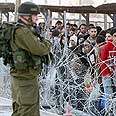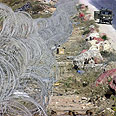

The Palestinian economy can't recover unless Israel dismantles a network of obstacles that has carved up the West Bank into a dozen enclaves and restricted Palestinian access to more than half the territory, the World Bank said in an exceptionally harsh report Wednesday.
Israel's web of physical and administrative barriers to movement goes at times beyond Israeli security needs and is aimed at boosting Jewish settlements, at the expense of the Palestinian population, the bank said.
Human rights groups have issued reports about some of the Israeli measures, such as a ban on immigration to the Palestinian territories and Palestinian drivers being banned from some main roads.
However, the 18-page World Bank document is the first comprehensive compilation of all the restrictions. In its main finding, the bank said closures have prevented a Palestinian economic recovery.
Israel: Problems result of terrorism
"The system has created such a high level of uncertainty and inefficiency that the normal conduct of business in the West Bank has become exceedingly difficult and investment has been stymied," said David Craig, the World Bank's director for Israel and the Palestinian territories. "Restoring sustainable Palestinian economic growth is dependent on its (the system's) dismantling."

Hawara checkpoint this week (Photo: Reuters)
Economists have said only such a recovery could reduce the Palestinians' dependence on foreign aid, which topped $1 billion last year.
Israel insists the closures are driven by security concerns alone.
"We have no interest whatsoever in seeing a failed Palestinian economy," said Israeli Foreign Ministry spokesman Mark Regev. "Many of the current problems are a direct result of terrorism, violence and political instability inside the Palestinian territories ... And the overall anarchy that exists."
'Closure system aimed at enhancing settlers' movement'
Many restrictions were imposed or tightened during the second Palestinian uprising, which began in 2000 and was accompanied by suicide bombings and shooting attacks.
In its new report, the World Bank acknowledges what it says are Israel's legitimate security concerns. However, it says the closure system is also aimed at "protecting and enhancing the free movement of settlers and the physical and economic expansion of the settlements at the expense of the Palestinian population."
The report was issued a month before the 40th anniversary of the 1967 Mideast War, in which Israel captured the West Bank, Gaza and east Jerusalem.
The bank estimated that access to more than 50 percent of the West Bank is restricted, including land around Jewish settlements. Some 700 kilometers (450 miles) of major West Bank roads are for non-Palestinians only, forcing Palestinian motorists to use sometimes circuitous side roads.
"As long as large areas of the West Bank remain inaccessible for economic purposes ... And unpredictable movement remains the norm for the vast majority of Palestinians, sustainable economic recovery will remain elusive," the bank wrote.















